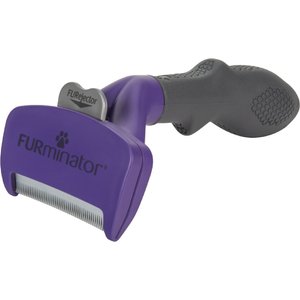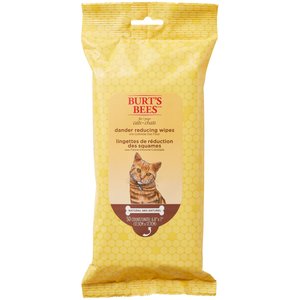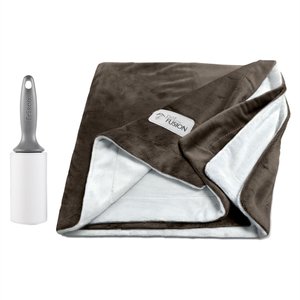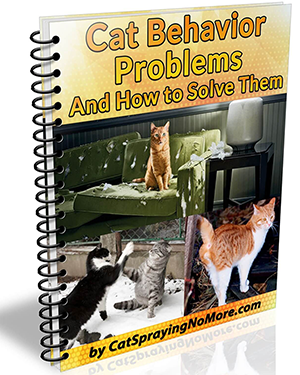Daily Archives: May 7, 2023
How to groom a long haired cat
Long-haired cats are absolutely beautiful, but they do require a little more grooming than short-haired cats. If you have a long-haired cat, it is important to regularly groom them to keep their coat healthy, clean, and free of tangles and mats. Here is a step-by-step guide on how to groom a long-haired cat.
-
Start by Brushing
The first step in grooming a long-haired cat is to brush their fur thoroughly. Use a slicker brush or a comb with long teeth to remove any tangles or mats. Begin by brushing their fur against the grain to loosen any tangles, then brush in the direction of the fur to remove any loose hair. Be gentle when brushing their fur, especially around sensitive areas such as the belly and legs.
-
Remove Tangles and Mats
If you come across any tangles or mats while brushing, use a comb with short teeth or a mat remover tool to gently work through them. Be careful not to pull too hard or cut the cat’s fur while removing tangles and mats.
-
Trim Their Fur
If your long-haired cat has particularly long fur, you may want to trim their fur with scissors or clippers to keep it from getting too long or tangled. Use sharp scissors and start trimming from the base of the fur, working your way towards the ends. Be careful not to cut too much off at once, as this can result in uneven fur.
-
Clean Their Ears
Long-haired cats are prone to ear infections, so it is important to regularly clean their ears to prevent any issues. Use a damp cloth or a cotton ball to gently wipe around the edges of their ears. Do not insert anything into their ear canal, as this can cause damage.
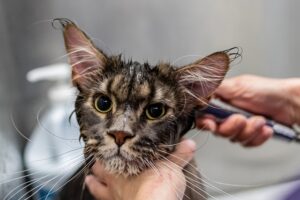
Image by Aleksandr Tarlõkov from Pixabay
-
Check Their Nails
Long-haired cats’ nails can grow quickly, so it is important to check their nails regularly to ensure they are not too long. Use cat nail clippers to trim their nails, being careful not to cut the quick, which is the pink part of the nail that contains blood vessels. If you are unsure how to trim their nails, ask your veterinarian for guidance.
-
Clean Their Eyes
Long-haired cats are also prone to eye infections, so it is important to regularly clean their eyes to prevent any issues. Use a damp cloth or a cotton ball to gently wipe around their eyes. If your cat’s eyes are particularly watery or crusty, consult your veterinarian for advice.
-
Bathe Them
If your long-haired cat becomes particularly dirty or smelly, you may need to bathe them. Use a cat-specific shampoo and follow the instructions on the bottle. Be sure to rinse their fur thoroughly, as leftover shampoo can cause skin irritation.
-
Dry Them Off
After bathing, use a towel or a hairdryer on a low heat setting to dry off your cat’s fur. Be sure to dry them off completely, as damp fur can cause skin irritation or lead to tangles and mats.
-
Finish with a Brush
Once your long-haired cat is clean and dry, finish with a thorough brush to remove any remaining loose hair. Use a slicker brush or a comb with long teeth to brush their fur in the direction of the fur.
Tips and Tricks grooming a long haired cat:
- Regular grooming is key to keeping your long-haired cat’s fur healthy and tangle-free. Aim to groom your cat at least once a week, if not more often.
- Be gentle when brushing or combing your cat’s fur, especially around sensitive areas such as the belly and legs.
- If your cat has particularly thick fur, you may want to invest in a de-shedding tool or a mat remover tool to help keep their fur under control.
- If you are unsure how to groom your long-haired cat, consider taking
Check out Best cat products for shedding since this would help you groom your long haired cat.
Best cat products for shedding
Shedding is a natural process for cats, but it can be frustrating for owners who are constantly cleaning up fur around their homes. Luckily, there are many cat products on the market that can help reduce shedding and make life easier for both cats and their owners. In this article, we will discuss the best cat products for shedding and how they work.
-
Furminator deShedding Tool
The Furminator deShedding Tool is one of the most popular cat products for shedding on the market. It is a grooming tool that helps to remove loose fur from cats’ coats, reducing shedding and helping to prevent hairballs. The tool has a stainless steel edge that reaches through the topcoat to remove loose undercoat hair without damaging the topcoat. It also has a comfortable grip handle that makes it easy to use.
-
FURminator Hairball Prevention Shampoo
FURminator Hairball Prevention Shampoo is a cat shampoo that helps to reduce shedding and prevent hairballs. It contains omega 3 and 6 fatty acids, papaya leaf extract, and calendula extract, which help to nourish the skin and coat and reduce shedding. The shampoo is also designed to help reduce hairballs by lubricating the digestive system, making it easier for hair to pass through.
-
Burt’s Bees for Cats Dander Reducing Whip
Burt’s Bees for Cats Dander Reducing whip is a natural cat product that helps to reduce shedding and dander. It contains natural ingredients such as aloe vera and colloidal oatmeal that help to soothe and moisturize the skin, reducing shedding and dander. The spray is easy to use and can be applied to cats’ coats to help reduce shedding and promote healthy skin and coat.
-
ChomChom Roller
The ChomChom Roller is a cat product that helps to remove pet hair from furniture and clothing. It has a patented design that uses static electricity to attract and remove pet hair from any surface. It is easy to use and does not require any adhesive or sticky tape. The ChomChom Roller is also reusable and eco-friendly, making it a great choice for environmentally conscious cat owners.
-
Shed Defender
The Shed Defender is a unique cat product that helps to reduce shedding and keep cats’ coats clean. It is a bodysuit that fits snugly around cats’ bodies, covering their fur and preventing loose hair from falling out. The Shed Defender is made from breathable, stretchy fabric that is comfortable for cats to wear. It is also machine washable and easy to care for.
-
KONG ZoomGroom
The KONG ZoomGroom is a grooming brush that helps to reduce shedding and promote healthy skin and coat. It has a unique design that massages cats’ skin and stimulates the production of natural oils, which help to keep cats’ coats healthy and shiny. The brush is easy to use and can be used on both wet and dry coats.
-
Omega-3 Supplements
Omega-3 supplements are a natural cat product that can help to reduce shedding and promote healthy skin and coat. Omega-3 fatty acids are essential nutrients that help to nourish the skin and coat, reducing shedding and promoting healthy fur growth. Omega-3 supplements can be found in various forms, including fish oil and flaxseed oil, and can be added to cats’ food or given as a treat.
Why omega-3 is good for your cat’s fur.
Omega-3 supplements are a great addition to a cat’s diet as they provide numerous health benefits for cats, including promoting healthy skin and a shiny coat. Omega-3 fatty acids are essential nutrients that cannot be produced by the cat’s body, so they must be obtained through their diet or supplements.
Omega-3 fatty acids are a type of polyunsaturated fat that are found in fish oil, flaxseed oil, and other sources. They help to nourish the skin and coat by reducing inflammation, moisturizing the skin, and promoting healthy fur growth.
When cats consume omega-3 supplements, they help to improve the quality and texture of their fur. Omega-3 fatty acids can help to reduce shedding and prevent dry, flaky skin, which can cause irritation and discomfort for cats. By promoting healthy skin, omega-3 supplements can also help to reduce the risk of skin allergies, infections, and other skin problems.
In addition to promoting healthy skin and fur, omega-3 supplements also provide other health benefits for cats. They help to support cognitive function, reduce inflammation, and improve heart health. They can also help to support immune function and reduce the risk of certain chronic diseases.
It is important to note that not all omega-3 supplements are created equal, and some may be more effective than others. It is important to choose a high-quality supplement that is specifically designed for cats, as some supplements may contain harmful additives or contaminants.
Overall, omega-3 supplements are a great addition to a cat’s diet as they provide numerous health benefits, including promoting healthy skin and a shiny coat. By nourishing the skin and reducing inflammation, omega-3 supplements can help to keep cats looking and feeling their best.
-
Lint Roller
A lint roller is a simple and effective cat product that helps to remove pet hair from clothing and furniture. It is an inexpensive tool that can be found in most stores and is easy to use. Simply roll the lint roller over any surface that has pet hair on it, and the sticky paper will pick up the hair.
In conclusion
Shedding is a natural process for cats, but it can be managed with the help of the right cat products. These products can help reduce shedding, promote healthy skin and coat, and make life easier for both cats and their owners.
When choosing cat products for shedding, it is important to consider the needs of your cat. Some cats may have sensitive skin or be prone to allergies, so it is important to choose products that are gentle and non-irritating. Additionally, some cats may be more resistant to grooming than others, so it may take some trial and error to find the right grooming tool for your cat.
Overall, the best cat products for shedding are those that are effective, safe, and easy to use. With the right combination of grooming tools, supplements, and cleaning products, cat owners can manage shedding and keep their homes clean and fur-free.
This content may contain links to products, software and services. Please assume all such links are affiliate links which may result in my earning commissions and fees.
Characteristics of a Maine coon cat
Maine Coon cats are among the largest domesticated cat breeds in the world, and they are also one of the most popular breeds in the United States. They are known for their majestic appearance, friendly disposition, and unique personality traits. In this article, we will discuss some of the key characteristics of the Maine Coon cat breed.
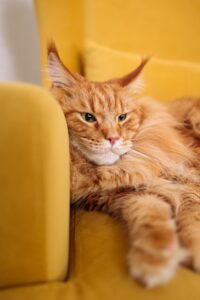
Orange Maine Coon by Thirdman from Pexel
Physical Appearance of a Maine Coon
One of the most notable characteristics of the Maine Coon is its size. They are typically larger than most other cat breeds, with some adult males weighing up to 25 pounds. They have long, thick fur that comes in a variety of colors and patterns, including tabby, black, white, and calico.
Maine Coons have large, tufted ears and big, expressive eyes that are typically green or gold. They have a distinctive face shape that is slightly square with high cheekbones, giving them a regal and dignified appearance.
Personality of a Maine Coon
The Maine Coon is known for its friendly and sociable nature. They are often described as “gentle giants” because of their size and easy-going temperament. They are great with children and other pets and enjoy being around people.
Maine Coons are also known for their playful and curious personalities. They love to play and explore, and they are often compared to dogs because of their loyalty and affectionate nature. They are also intelligent and can be trained to perform tricks or play games.
Health of a Maine Coon
Maine Coons are generally healthy cats, but they are prone to some health issues that are common in large cat breeds. These include hip dysplasia, which can cause joint pain and mobility issues, and hypertrophic cardiomyopathy, a type of heart disease that can be fatal if left untreated.
To keep your Maine Coon healthy, it’s important to provide them with a balanced diet and plenty of exercise. Regular vet check-ups are also essential to catch any potential health problems early.
Grooming of a Maine Coon
Maine Coons have thick, long fur that requires regular grooming to keep it healthy and tangle-free. They shed seasonally, so it’s important to brush them frequently during shedding periods to remove loose fur and prevent matting.
Maine Coons also have large, tufted ears that can collect dirt and debris, so regular ear cleaning is important to prevent infection. Finally, they also need regular nail trims to prevent overgrowth and discomfort.
Overall, the Maine Coon cat breed is a wonderful choice for families looking for a friendly, sociable, and majestic pet. They are loyal, intelligent, and playful, and their unique physical appearance makes them a striking addition to any home. With proper care and attention, they can live long, healthy lives and provide years of love and companionship to their owners.

Get Cat Language Bible
Now about the characteristics of an orange cat

Get Cat Language Bible
Interesting facts about Maine Coons
Maine Coon cats are one of the oldest natural breeds of cats in North America. They are known for their large size, striking appearance, and friendly personality. Here are some interesting facts about Maine Coons:
- Origin and Name: The Maine Coon breed originated in the state of Maine in the United States. The breed’s name is derived from the state’s name, and the word “coon,” which is a colloquial term for raccoons, with whom they were once thought to have a resemblance.
- Size and Appearance: Maine Coons are known for their large size and fluffy appearance. They are one of the largest cat breeds, with males weighing between 13-18 pounds, and females weighing between 8-12 pounds. They have long, bushy tails, and their ears are adorned with tufts of fur.
- Unique Paws: Maine Coons have unique paws that are designed for walking on snow. Their paws are large and round, with tufts of fur between their toes, which act like snowshoes to help them walk on deep snow.
- Water Lovers: Maine Coons are known for their love of water. They enjoy playing with water and will often dip their paws in their water bowls to splash around. Some Maine Coons have even been known to swim in pools or lakes.
- Gentle Giants: Despite their large size, Maine Coons are gentle and affectionate cats. They are known for their friendly personality and their love of human companionship. They are often called the “gentle giants” of the cat world.
- Talkative: Maine Coons are known for being talkative cats. They are not shy about expressing themselves and will often meow, chirp, and trill to communicate with their owners.
- Colors and Patterns: Maine Coons come in a variety of colors and patterns, including black, white, red, cream, brown, and orange. They also have a variety of patterns, including tabby, tortoiseshell, and solid colors.
- Health and Longevity: Maine Coons are generally a healthy breed of cat, with a lifespan of 12-15 years. They are prone to a few health issues, including hip dysplasia and hypertrophic cardiomyopathy, but these can be managed with proper care and attention.
In conclusion, Maine Coons are a fascinating breed of cat that have captured the hearts of many cat lovers around the world. Their unique appearance, friendly personality, and love of water make them a delightful addition to any household.

Get Cat Language Bible
Interesting facts about orange cats
Orange cats, also known as ginger or marmalade cats, are a popular and well-loved feline breed. They are known for their striking orange coat and their playful and affectionate personalities. Here are some interesting facts about orange cats:
- Genetic Mutation: The orange color of a cat’s coat is caused by a genetic mutation that affects the production of pigment. This mutation can occur in both male and female cats.
- Different Shades: Orange cats come in a variety of shades, ranging from light yellow to deep red. Some cats may have white markings on their fur, adding to their unique appearance.
- Good Luck: In some cultures, orange cats are considered good luck. In Japan, for example, they are thought to bring wealth and prosperity to their owners.
- Sociable: Orange cats are known for being sociable and friendly. They enjoy spending time with their owners and will often follow them around the house.
- Vocal: Orange cats are known for being vocal and will often meow and purr to communicate with their owners.
- Health: Orange cats are generally healthy, but they may be prone to certain health issues such as obesity and dental problems.
- Famous Orange Cats: There have been many famous orange cats in pop culture, including Garfield, Heathcliff, and Hobbes from the comic strip Calvin and Hobbes.
In conclusion, orange cats are a unique and beloved breed of feline that bring joy and companionship to their owners. Their striking orange coat, friendly personality, and good luck make them a delightful addition to any household.
Check out an article on Maine coon and Norwegian forest cat which is a close relative breed of domestic cats.
This content may contain links to products, software and services. Please assume all such links are affiliate links which may result in my earning commissions and fees.
